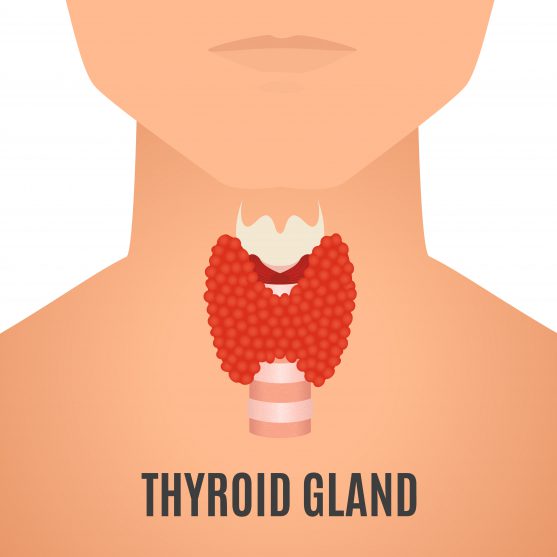Here’s everything you need to know about papillary carcinoma thyroid.
As you might have noticed, cancers are labeled by the organ or tissue where they begin. For example, all cancers that start in the lungs are called lung cancer. Similarly, thyroid cancers start in the glands present in the front part of the neck, called thyroid glands. These are butterfly-shaped glands.
Thyroid hormones control the body’s metabolic rate, controlling heart, muscle and digestive function, growth, development, body temperature and bone maintenance. During infancy and childhood thyroid hormone is crucial for brain development.

Are thyroid nodules common?
A thyroid nodule is an unusual growth (lump) of thyroid cells.Sometimes the thyroid begins to grow (overgrowth), causing one or more nodules to form.
Thyroid nodules can be of different types like colloid nodules, thyroid cysts, inflammatory nodules, multinodular goiter and thyroid cancer.
The abnormal overgrowth of cells in the thyroid glands can lead to cancer. Thyroid nodules are very common and at least half the people over the age of 60 years have at least one thyroid nodule. But 95% of such nodules are benign, meaning they are not cancer.
Who is more likely to get this cancer?
The exact reason why we get thyroid cancer is not known, but it is understood that it is because of certain inherited conditions.
Here are some interesting facts about who is more likely to get thyroid cancer:
- For unknown reasons, women are three times more likely to get thyroid cancer than men.
- Most women who get it are between 40 to 50 years of age and most men are between 60 to 70 years of age.
- People who do not have sufficient Iodine in their diet are at higher risk.
- Some types of thyroid cancer are associated with genetics. If you have a parent, sibling or child who has suffered from thyroid cancer, then you are more likely than others to have it too.
- Certain diseases like familial adenomatous polyposis and cowden disease put you at higher risk.
- Exposure to radiation early in life is also a risk factor.
What can I do to prevent thyroid cancer?
As you can see, most of the above factors cannot be controlled by us, like age, gender or family history. There is one factor that is within our control: Iodine.
You can improve the Iodine in your diet by consuming dairy products and certain fish like cod. Most varieties of common salt available in India have added Iodine in them and that helps us improve the health of our thyroid glands.
Another thing you should do is be alert to the symptoms of thyroid cancer listed below. Early detection of the cancer makes it much easier to treat and cure.
How can I know if I have thyroid cancer?
There are some common symptoms of thyroid cancer and if you are suffering from these, you need to consult a doctor for further investigation.
- A growing lump in the neck
- Swelling of glands in the neck
- Neck pain that extends to the ears
- Unexplained changes in voice or hoarseness of voice
- Trouble swallowing or breathing
As you can see, some of these symptoms are very common and so we cannot be sure if they are indicative of thyroid cancer or not. But if you do suffer from these symptoms for a longer period of time, and if symptomatic medication is not helping, then you do need to visit a doctor to know more about what is causing it.
What is papillary carcinoma thyroid cancer?
There are five types of thyroid cancer, papillary carcinoma, follicular carcinoma, hurthle cell carcinoma, medullary thyroid carcinoma, and anaplastic carcinoma. Papillary thyroid cancer is the most common of these.
Papillary thyroid cancer originates in the follicular cells of the thyroid glands. It usually affects only one lobe of the thyroid, rarely affecting both lobes.
Many people who suffer from this type of thyroid cancer face no symptoms, except maybe a mass around the neck.
About 80% of all thyroid cancers caused by exposure to radiation fall into this category.
Is papillary carcinoma thyroid cancer curable?
This is a very slow growing cancer and the ten-year survival rate is above 90%. This means that it is an easily curable cancer.
An important thing to remember here is that the sooner the cancer is detected, the better the survival rates will be. With time, this type of cancer spreads to the lymph nodes in the back of the neck. However, spread to distant organs like the liver, lungs or bones is very rare.
How does the doctor check if it is thyroid cancer?
If your doctor suspects that the neck swelling is a type of thyroid cancer, he will first conduct a medical examination of your thyroid and your general health.
An ultrasound will be conducted to check presence and the nature of the nodules, for example, if they are solids or fluid filled.

ultrasound of the thyroid glands
Blood hormone tests will be done to check for the levels of T3, T4 & thyroid stimulating hormones (TSH).
Blood chemistry tests might be recommended to check for abnormal levels of certain substances like calcium in the blood, which are indicative of certain diseases.
Before starting on the treatment, your oncologist will perform a biopsy, during which a needle will be inserted in the swelling/nodule to extract cells from the tumour. These cells will then be examined under a microscope. This is one of the most reliable ways of confirming that it is cancer.
A CT or MRI may be advised for the evaluation of fixed, bulky, or substernal (behind the chest bone-sternum) lesions.
How is papillary carcinoma thyroid treated?
Papillary carcinoma thyroid cancer is staged into four stages from I to IV depending on tumour size, extension, neck node/glands involvement and spread to other organs. Staging in thyroid cancer differs for individuals below or above 55 years of age.
Depending on the stage, the treatment might vary, but these are the modes of treatment that are usually used:
Surgery
Surgery is the definitive treatment of papillary thyroid cancer. This is the most common mode of treating papillary carcinoma thyroid cancer.
Depending on the size and extent of the lesion, either a Thyroid lobectomy (removal of just that lobe) or a total thyroidectomy (the entire thyroid gland is removed) is carried out. If the cancer has spread to nearby lymph nodes then they are also removed during the surgery.
Radioiodine Therapy
Approximately 4-6 weeks after surgical thyroid removal, some patients may be administered radioiodine therapy to detect and destroy any metastasis and residual tissue in the thyroid. The decision for radioactive iodine will be taken by the treating physician, depending on the size of the tumors removed, the risk category and the prognostic features.
Radiation therapy
It may be used sometimes for patients who have extensive involvement of nearby tissues that cannot be surgically removed.
Chemotherapy
Chemotherapy would be considered as a palliative option in symptomatic patients with recurrent or advanced disease, and it may improve the quality of life in such patients.
Targeted therapy
Sometimes, targeted therapy or Immunotherapy may used to target specific cancer cells that show signs of growth and division and some genetic mutations found in tumour tissue. This is usually used in advanced stages of thyroid cancer where Radioiodine therapy fails.
Thyroid hormone replacement therapy
Patients will require lifelong thyroid hormone replacement therapy, especially after total thyroidectomy. Thyroxine dose will be titrated depending on the desired TSH levels.
Once treatment is completed, the patient will be asked to follow-up with regular check-ups and investigations that would include ultrasound neck, serum TSH, serum Thyroglobulin and whole body iodine scan. It is very important to follow these guidelines set by the doctor.
In addition to that, a healthy diet and healthy body weight needs to be maintained. All tobacco products and alcohol need to be avoided.



